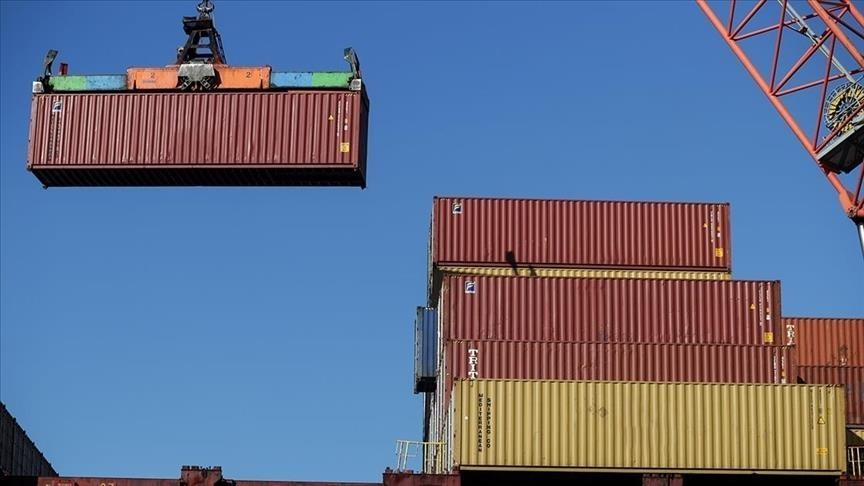LONDON
Freight rates have seen a slight decrease in the last two weeks after they skyrocketed amid geopolitical tensions in the Red Sea.
But the rates still are well above last year’s levels.
The 40-foot container composite index stood at $1,382 on Nov. 30, according to data from the Drewry World Container Index compiled by Anadolu.
The Iranian-backed Yemeni political organization, the Houthis, launched attacks on commercial vessels linked to Israel in the Bab-el-Mandeb Strait in the Red Sea, after which shipping companies rerouted around the Cape of Good Hope, thus extending travel times by 10 days to two weeks.
Ship traffic in the Red Sea rapidly declined and the rerouting caused freight rates to double due to counter-attacks against the Houthis, led by the US and the UK. Shipping companies were advised not to navigate through the region.
It has been nearly three months since the tensions in the Red Sea started, and although the increase in freight rates slowed, prices are still quite high.
The prices rose for eight weeks, reaching $3,964 on Jan. 25, up 186.8%, amid increased tensions in the Red Sea and rerouting of commercial vessels.
The composite index per 40-ft. container was at $3,824 on Feb. 1, and at $3,786 on Feb. 8, posting a two-week decline of 4.5%, though it is 90% higher year-on-year and 174% above the level on Nov. 30, and up 167% compared to pre-coronavirus pandemic levels.
As of Feb. 8, the composite index per 40-ft. container on the Shanghai-Geneva route decreased 11% week-on-week to $5,225, Shanghai-Rotterdam 5% to $4,426, and New York-Rotterdam 4% to $611, whereas the Shanghai-Los Angeles route posted an uptick of 8% to $4,771, and Shanghai-New York 2% to $6,268.
Crisis in Red Sea may continue for lack of solution
Shipping companies started to adjust their planning and budgeting to the longer route around the Cape of Good Hope and the initial rush started to normalize, despite the persistent and high tensions in the Red Sea, said experts.
Experts note that the tension in the Red Sea has not affected the US, though European importers are most affected, and they estimate that the crisis will continue until a solution is found in the Red Sea.
Freight volume in Red Sea down 80%
Freight volume in the Red Sea fell by more than half in December, and in January, the volume in the Red Sea and the Suez Canal was 80% lower than before the crisis, according to the German economic institute, IfW Kiel.
“Arrivals at ports in Southern and Northern Europe are being delayed. In Hamburg and Bremerhaven, as well as in Rotterdam and Antwerp, 25% fewer ships dock compared to the average numbers of 2023, as of January 2024,” it said Wednesday.
“Container ships are significantly delayed compared to their original plans, resulting in fewer ship arrivals in many European ports,” said Julian Hinz, head of the Kiel Trade Indicator.
Hinz noted that the difference will only normalize as longer travel routes are factored into logistical planning.
“While individual companies may suffer from delivery delays, overall, there are no shortages expected in raw materials or consumer goods; one reason for the brisk trade activity may also lie in the Chinese New Year, as trade in China typically picks up before the holidays, however, it tends to decrease afterward,” he added.
Maersk expects prices to normalize as transit through Suez Canal starts
A third of Danish shipper Maersk’s freight volumes were affected by the disruption in Red Sea’s traffic, and the company will not resume transiting in the Red Sea until safety in the area is guaranteed, Vincent Clerc, CEO of Maersk, said Thursday.
Freight prices and the profits of shippers rose sharply during the pandemic, though Clerc said the situation now is not comparable, and the prices will plummet as soon as vessels go back to transiting through the Suez Canal.
Shippers that reroute upon attacks in Red Sea
Maersk was among the first shippers to reroute vessels around the Cape of Good Hope after the Houthis attacked ships linked to Israel in the Bab-el-Mandeb Strait in the Red Sea, as the company announced Jan. 5. After one of its vessels was attacked by the Houthis, it directed all of its vessels through the Red Sea-Gulf of Aden to the south around the Cape of Good Hope in the near future.
Following attacks on the Bab-el-Mandeb Strait in the Red Sea, Maersk, the world’s largest container company, Italian-Swiss Mediterranean Shipping Company (MSC), German shipping company Hapag-Lloyd, French shipping company CMA CGM and the British energy company BP suspended operations in the region.
The Danish tanker company, Torm, suspended operations through the southern Red Sea, while the UK-based oil company, Shell, followed suit.
Qatar’s state-owned oil firm QatarEnergy announced that there would be a delay of 10 to 12 days in LNG shipments to Europe.
The Suez Canal connects the Mediterranean and the Red Sea and is the shortest route between Europe and Asia, accounting for about 12% of global trade.

